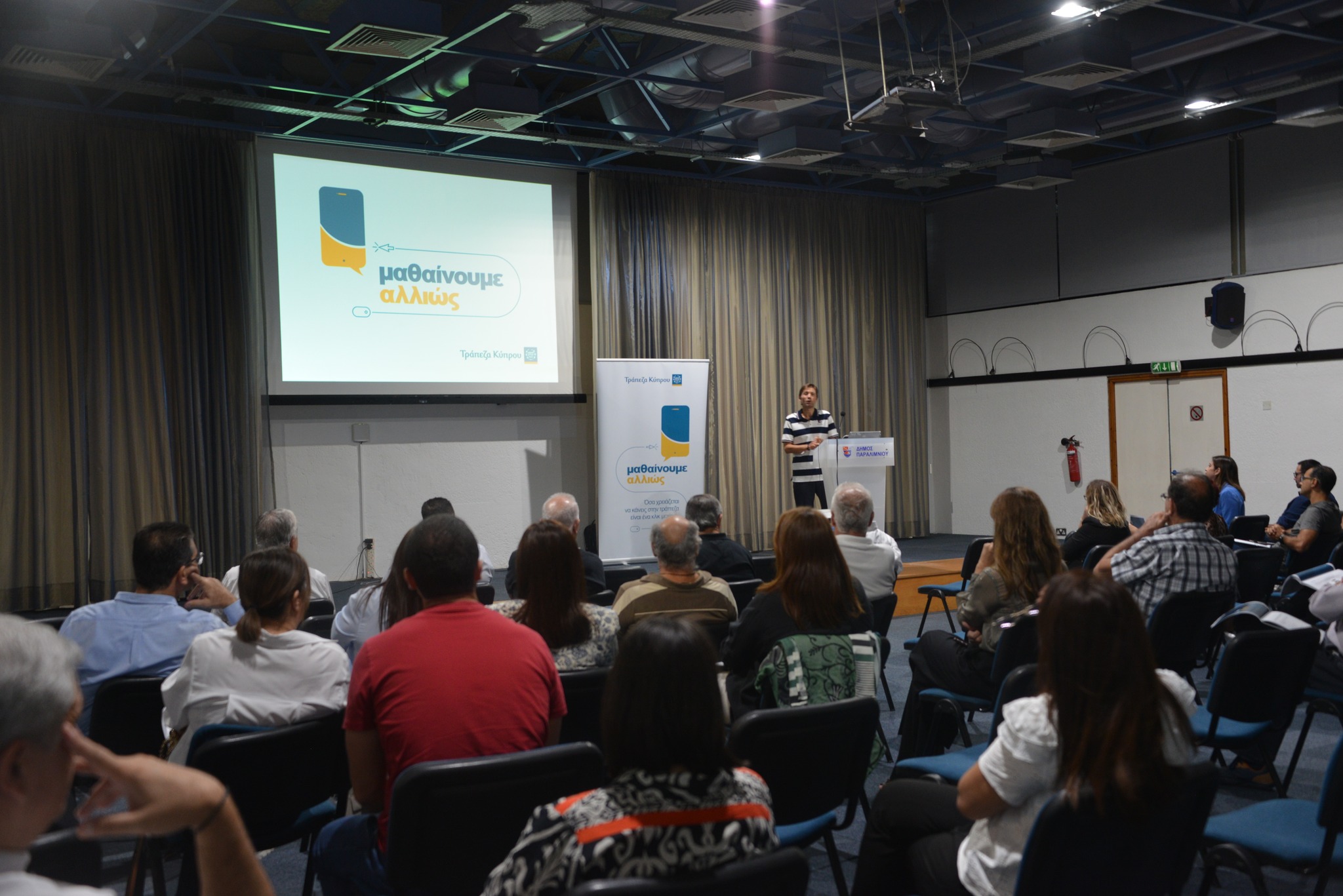Bank of Cyprus’ Corporate Social Responsibility Manager: “Update your Skills” teaches financial and digital literacy to both younger and older people”
In an interview with Cyprus Mail, Bank of Cyprus’ Corporate Social Responsibility (CSR) Manager Elli Ioannidou, highlights that “the Bank seeks to make a difference in Cypriot society and contribute to the continuous socio-economic development of the island, remaining a strong driving force of sustainable development in the country, following its basic principle of Beyond Banking.” Mrs. Ioannidou highlights the significance of programmes aimed at educating the public and bank clients on financial literacy.
Can you start by sharing a brief overview of your role and responsibilities within the bank?
As the CSR Manager, my responsibilities include creating the CSR strategy and managing the progress and execution of the Bank of Cyprus Group’s social responsibility goals, as well as raising public and internal awareness, including our corporate volunteers’ initiatives, about the Group’s social responsibility pledges. In order to better the environment and nearby communities, my team and I conduct research on social needs and requirements, come up with new ideas, create detailed plans, connect with affiliated groups and then carry out, supervise and manage a range of tasks and initiatives within the scope of CSR.
Additionally, as the CSR Manager, I establish connections with important players in industry, government, civil society, local authorities and non-governmental and non-profit organisations to gather crucial information about the expanding social and environmental concerns and collaborate with them for better and stronger impact.
What is the overarching vision of your bank regarding financial literacy and community engagement?
We firmly believe that providing our communities with sound financial education is not only an essential component of what we do but also the core of our purpose.

We’re dedicated to helping community members become confident and adept at navigating the complexities of the financial world. Banks are in a unique position to provide this support.
We’re committed to offering educational content that not only enhances shareholders’ financial literacy but also promotes their professional and personal development and success.
Financial and digital literacy
What specific financial literacy programmes does your bank currently offer to its customers and the wider community?
At Bank of Cyprus, we consider financial literacy to be an essential life skill. In 2024, continue our highly engaging educational programme, “Update your Skills”, on financial and digital literacy to both younger and older people. The programme, presented in town halls and communities in collaboration with local authorities, educates seniors in particular, who face unique financial challenges, such as protecting themselves against financial scams. To address their needs, our staff members who specialise in financial matters, conduct these workshops on subjects related to digital banking in order to meet these demands. Additionally, we have created a series of short videos accessible online, demonstrating how to complete banking transactions quickly and efficiently using our Bank’s technology and digital tools.
In what ways has your bank leveraged technology to enhance financial literacy among its customers?

In the current era of innovations in digital banking, digital literacy is essential. Everything around us is managed through online procedures and in the near future most of our activities will be done only through digital means. Therefore, our customers must possess digital literacy skills in order to access and utilise digital banking services, which are becoming increasingly more common. These skills include using online banking platforms, completing secure transactions and managing finances digitally.
Customers who have registered online are more inclined to use digital banking services, eliminating the need for in-person branch visits. This shift saves banks time and money, enhancing operational effectiveness. Additionally, digitally literate individuals can access real-time financial information, monitor their accounts and receive instant alerts, making them feel more secure and trusted by their banking institution.
At Bank of Cyprus, we have set a well-defined course for our digital transformation journey, which we follow consistently. The compass of this course is always the customer. All our efforts and projects arise from our customers’ needs and are designed to address them most effectively.
Educational initiatives
How does your bank identify and address the unique financial literacy needs of the Cypriot community?
Community banks struggle to stay relevant and establish meaningful connections with their audience in today’s ever-changing digital landscape.
Promoting financial literacy not only serves our consumers but also helps our bank gain the trust, loyalty and involvement of its diverse customer base. Our organisation can significantly impact people’s ability to make wiser financial decisions and ultimately aid in developing a more financially literate society by providing customised education and resources.
To satisfy our clients’ evolving demands, our bank continually assesses and adapts its educational initiatives. Keep in mind that promoting financial literacy is an ongoing activity that requires constant attention and refinement.
What do you think are the specific challenges or opportunities related to financial literacy in Cyprus?
A recent study by the Economics Research Centre at the University of Cyprus has brought to light issues regarding financial literacy in the country. Titled “Financial Literacy for Financial Resilience: Evidence from Cyprus during the Pandemic Period”, the study found that in 2021, fewer than four out of ten respondents had a good understanding of financial concepts. This means that many people lack the knowledge needed to make informed financial decisions.
The study also revealed that more than one out of three Cypriots are financially vulnerable, meaning that they wouldn’t be able to handle an unexpected expense without borrowing money or seeking help.
The study’s authors argue that financial education could play a key role in helping households improve their financial literacy and better prepare for future financial shocks. This highlights the importance of implementing policies aimed at increasing financial literacy among the population.
Without an adequate level of financial literacy, individuals may be vulnerable to excessive risk-taking, over indebtedness and financial scams. In addition, poor financial decision-making can lead to personal financial struggles and even broader economic issues such as increased financial stability risks and low economic growth.

CSR initiatives
How is financial literacy integrated into your bank’s broader corporate social responsibility strategy?
CSR initiatives can play a crucial role in promoting financial literacy. CSR initiatives can take numerous forms, from educational programmes geared towards employees to community-based financial education efforts. Programmes geared towards employees, such as financial wellness programmes and access to financial planning services, can help improve employee financial management skills, boosting both productivity and job satisfaction.
Moreover, CSR initiatives can also help bridge the financial literacy gap for underserved communities. By partnering with local organisations and non-profits, businesses can provide financial education and resources to those who might not have access otherwise. This can include workshops, low-cost banking services and financial planning assistance. By empowering individuals with the knowledge and tools to make informed financial decisions, CSR initiatives have the potential to support financial stability and economic progress in these areas by equipping individuals with the necessary knowledge and resources to make responsible financial decisions.
What steps are being taken to ensure that your financial literacy programmes remain relevant and effective in a rapidly changing financial landscape?
Financial literacy and financial capability are issues that are extremely important to our country’s economic future. To maintain a competitive economy in the years to come, we need a population that is capable of planning for and managing its financial well-being. For that to occur, financial literacy and capability among our people must improve and parents, schools, financial institutions and government must all take an active role in improving our citizens’ level of financial literacy.
We align with the National Strategy and are ready to cooperate with government bodies to achieve its goals.
But furthermore, in order to achieve even better results, at Bank of Cyprus we invest in additional initiatives that educate youth in their development in soft skills, public debating, time management and innovative and creative thinking. Our literacy programmes remain effective and relevant, helping our citizens of all ages to make sound financial and business decisions and contribute to the country’s economic stability and growth.







Click here to change your cookie preferences